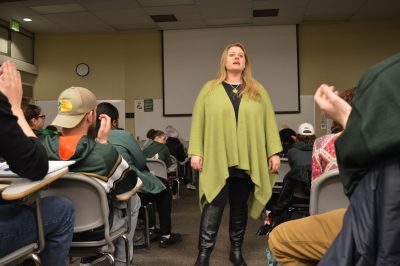~ Story by Nicole Towne. Reprinted from the Collegian with permission
It is a Tuesday afternoon and approximately 150 students gather in the Aylesworth lecture hall for music appreciation class. Professor Denise Apodaca walks up and down the aisles, talking with students in the minutes leading up to the start of class. As class begins she instructs students to put away all electronic devices. In today’s class students learn about music philanthropy as seen in the 1985 recording “We are the World.” Students engage with student presenters. They sing and follow the movements as one student leads a camp song. They join in as another performs “Can’t Help Falling in Love.” When the class ends Apodaca packs up her things and walks over to the Behavioral Sciences building as she prepares to teach her second music appreciation class to about 250 students.
Apodaca has been teaching at Colorado State University for four years although she identifies as being a teacher since she started teaching piano lessons at age 15.
Born in Inglewood, California, Apodaca lived in a bilingual home. Her father was born and raised in Mexico and her mother was Irish. Her first language was Spanish.
She started playing piano at age four. It allowed her to have her own sense of a language in a world that could not seem to understand her, Apodaca said.
“I loved having that time where I didn’t have to explain anything or there wasn’t that frustration with communication with people looking at me and saying ‘what is she saying? What is she doing? Who is she? Why is she not speaking English? We can’t understand her,’” Apodaca said.
She attended the University of California, Santa Barbara on a full scholarship to study piano. Apodaca continued her education by receiving two master’s degrees in piano performance and piano pedagogy at Northwestern University.
Apodaca is a single mother with three daughters and three dogs. She teaches 25 private piano lessons as well as an introductory piano class for music majors in addition to her music appreciation classes.
“As much as I say that I am so passionate as a musician, I am equally passionate as an educator, as a teacher,” Apodaca said.
Apodaca takes this passion into the classroom where she strives to get to know her students and let them know that they are more than a number.
“I need to know the students who are sitting in front of me,” Apodaca said. “I need to know who they are.”
She does this, in part, by reading class reflections from all of her students, including the 300 plus students in her two music appreciation classes.
“She spends a great deal of time getting to know as many students as she can in those music appreciation classes,” said friend and fellow CSU music professor Leslie Stewart. “She’s had a tremendous impact on many of those students.”
Kennedy Malone, junior music education major, had Apodaca as a professor for piano proficiency class her freshman year.
“She’s beautiful,” Malone said. “I just love that lady. Freshman year, for me, wasn’t the best. She really helped me get through it. She made it easier.”
She gave hugs, Malone said. When she asked how you were, she really listened.
Apodaca strives to create a caring and compassionate community in her classroom and her students continue to inspire her.
“I think this loving culture is what keeps me going,” Apodaca said. “These kids give me faith in humanity.”
Apodaca finds beauty in the way the students in the classroom can come together and experience music as a caring community.
“Music can be this sense of a unification of so many different people,” Apodaca said. “It just knocks down walls. It knocks down barriers. There’s no judgment that comes with music. We can like it or not but we can connect with it. We don’t have to sit and talk and I think that’s what so much resonated with me.”
As a teacher and a lover of piano Apodaca views music as more than words and notes on a page. She sees music as a way of human connection.
“It’s very easy for us to get focused on the technicalities of becoming a better musician or doing a better job performing music but in the end what really matters is how we touch people through music on the emotional level and how music can really be used as a healing art,” Stewart said. “I think that’s something that Professor Apodaca lives and breathes every day and imparts to her students and I think that’s really inspiring.”


